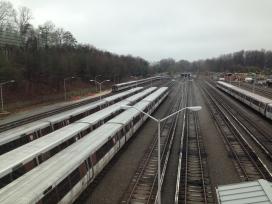FTA Releases WMATA Rail Vehicle Securement Investigation Report and Issues Safety Directive to Correct Systemic Safety Deficiencies
8/24/2016
WASHINGTON – The U.S. Department of Transportation’s (DOT) Federal Transit Administration (FTA) today issued Safety Directive 16-6 to the Washington Metropolitan Area Transit Authority (WMATA) requiring the transit agency to ensure that unattended rail vehicles are adequately secured in its Metrorail system by implementing six required actions.
The Safety Directive is based on six findings set out in a Rail Vehicle Securement Investigation Report also released today. The report includes findings from FTA’s spring 2016 “Safety Blitz” assessment of vehicle securement for unattended trains in the Metrorail system. The investigation uncovered a lack of compliance with WMATA’s internal rules and procedures for unattended rail vehicle securement for both revenue passenger trains and maintenance machines and equipment located in rail yards.
“Preventing unintended movement of rail vehicles is fundamental to safety and WMATA needs to do more to eliminate these types of incidents from happening,” said U.S. Transportation Secretary Anthony Foxx. “Verifying that a train has been properly secured is a common sense solution to prevent accidents.”
Unsecured and unattended trains or equipment can move in rail yards and on the mainline track, creating the potential for collisions with other trains, equipment, or workers. This is a significant safety concern across the rail industry, which has experienced several incidents in recent years. This includes one high-profile event in Chicago in 2013, which led the National Transportation Safety Board (NTSB) to issue an urgent Safety Recommendation to the FTA, and the FTA to issue an urgent safety advisory to the nation’s rail transit agencies.
The FTA initiated this investigation in light of the broad safety concerns, as well as three specific incidents that occurred on WMATA property since 2014, including a December 2015 incident when an empty, two-car Metrorail train rolled away in the New Carrollton rail yard.
“These incidents at WMATA amplify the need for the proper use of safety and securement devices to prevent unintended train movements that can cause accidents,” said FTA Acting Administrator Carolyn Flowers. “WMATA must revise, and its employees must observe, its operating rules to ensure proper and safe securement of rail vehicles.”
The FTA investigation focused on three main areas: redundant securement for rail vehicle storage, rules and procedures, and employee training. Some of the key safety findings include: WMATA does not provide for redundant protection when securing unattended rail vehicles; WMATA’s rules and procedures are unclear and ambiguous; and that employees are not provided with adequate training and accurate training materials on how to properly secure vehicles.
Since the FTA issued its Safety Management Inspection report in June 2015, and under the FTA’s direct safety oversight since October 2015, WMATA has taken of number of critical steps to address a variety of safety issues including stop signal overruns and track integrity. However, the FTA finds that WMATA must increase its efforts to ensure that its passenger and maintenance equipment is properly secured throughout its system.
As directed by Safety Directive 16-6, WMATA must develop corrective action plans to address the new findings of the report and related required actions. WMATA’s proposed corrective action plans are subject to FTA approval, and FTA will monitor the agency’s progress to implement the safety improvements.
FTA can enforce the required actions through a number of means, including the withholding of Federal financial assistance from WMATA, directing WMATA to use Federal financial assistance to correct safety deficiencies, and mandating restrictions or prohibitions on Metrorail operations (such as imposing speed restrictions or shutting down some or all system operations) to abate a substantial safety risk.
The report and Safety Directive are the latest actions taken by FTA as it provides temporary and direct oversight of WMATA Metrorail and the transit agency’s efforts to improve safety and bring the Metrorail system into a state of good repair.
###

